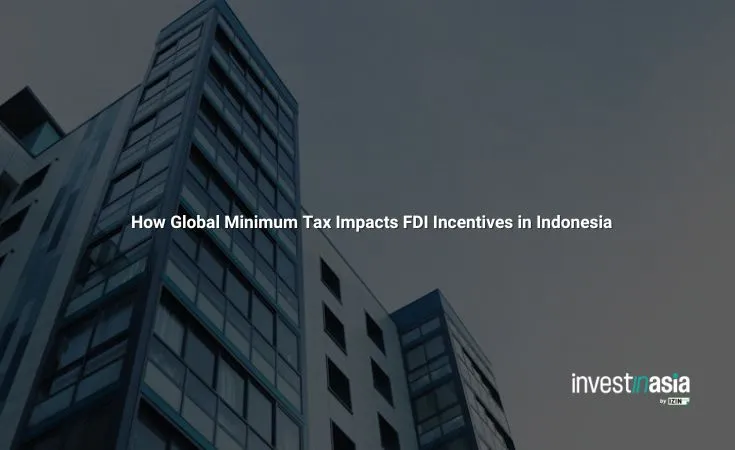The introduction of the Global Minimum Tax (GMT) in Indonesia is a game-changer for foreign direct investment (FDI). Effective from the 2025 tax year, this regulation shifts the strategy behind investment incentives. Traditional tax-based benefits are being reevaluated in favor of more sustainable, GMT-compliant approaches.
What does this mean for multinational enterprises, and how can Indonesia stay competitive?
What is the Global Minimum Tax?


The GMT is part of the OECD’s Base Erosion and Profit Shifting (BEPS) 2.0 Pillar Two framework. It mandates a 15% minimum effective tax rate on profits of large multinational enterprises (MNEs). The primary mechanisms enforcing this are the Income Inclusion Rule (IIR) and the Undertaxed Profits Rule (UTPR). These measures guarantee that multinational enterprises (MNEs) pay a minimum level of tax regardless of where they operate.
Why Was GMT Introduced?
The GMT aims to close loopholes that allowed companies to shift profits to low-tax jurisdictions. Over 135 countries have agreed to this system to curb tax base erosion and restore fairness in global taxation.
Also read; Understanding Indonesia’s Tax Transfer Pricing Regulations
Indonesia’s Response to GMT
Indonesia adopted GMT through Ministry of Finance Regulation No. 136 Year 2024. It affects MNE groups with parent entities earning over €750 million annually. The country has implemented top-up taxes to ensure local entities maintain the 15% effective tax rate.
How It Works
Companies must calculate their effective tax rates at a jurisdictional level. If their Indonesian subsidiaries fall below 15%, Indonesia or the parent company’s home country can levy a top-up tax.
Also read; How Indonesia’s Double Tax Treaties Benefit Foreign Investors
Impact on Traditional FDI Incentives
Erosion of Tax Benefits
Indonesia’s previous tax incentives like holidays and rate cuts are now less effective. Any incentive that drops a company’s effective rate below 15% triggers a top-up tax, neutralizing the benefit.
Safe Harbor Limitations
While Indonesia provides safe harbor options—like revenue thresholds or simplified reporting—these are limited. They rarely cover high-value investment projects and require robust economic substance proofs.
Also read; Tax Incentives in Indonesia: Key Benefits and Opportunities
Strategic Shifts in Investment Incentives
Non-Tax Alternatives
Indonesia is pivoting to non-tax incentives. These include:
- Infrastructure support
- Grants
- Enhanced depreciation
- Regulatory facilitation
These alternatives don’t interfere with GMT thresholds but still provide value to investors.
Also read; Indonesia Investment Incentives: Government Support for Foreign Businesses
Sector-Specific Focus
Incentives are being tailored for key sectors such as:
- Manufacturing
- Renewable energy
- Digital economy
- Natural resource processing
This targeted approach ensures high-impact sectors continue to attract FDI.
Also read: Top Foreign Investment Sectors in Indonesia
What This Means for Foreign Investors


Increased Compliance Complexity
GMT adds reporting obligations and administrative burdens. MNEs must now:
- Track jurisdictional tax data
- Reassess global tax strategies
- Establish GMT-compliant systems
The initial reporting deadline is 15 months post-fiscal year, extended to 18 months for 2025.
New Investment Evaluation Metrics
Tax is no longer the top priority. Investors will now prioritize:
- Market potential
- Skilled labor
- Regulatory clarity
- Infrastructure readiness
This benefits countries like Indonesia that offer strong fundamentals.
Also read; FDI Legal Protections in Indonesia: More Than Just Incentives
Economic and Policy Implications
Revenue Stability
Indonesia’s tax base is now more stable. MNEs must pay a minimum tax regardless of incentives. This improves budget predictability.
Reduced Fiscal Flexibility
However, policymakers now have less room to maneuver. Implementing emergency tax relief or competitive tax cuts becomes more challenging without violating Global Minimum Tax (GMT) regulations.
Looking Ahead: Indonesia’s Strategic Outlook
Indonesia is moving toward a value-driven FDI model. Incentives are being linked more closely to national development goals, such as technology transfer and job creation. This alignment ensures long-term gains from every dollar of investment.
The country’s early adoption of GMT also positions it as a thought leader in post-GMT investment policy. It could set a regional benchmark for balancing global compliance with local competitiveness.
If you are considering starting a business in Indonesia, there are a number of resources and support services available to help you get started.
InvestinAsia is among the companies that specialize in aiding you with Indonesia company registration. We boast a team of seasoned experts who can guide you throughout the process of:
- Foreign company / PMA registration in Indonesia
- Indonesia representative office registration
- PT PMDN Set Up
- Virtual office setup in Indonesia
- Business registration number in Indonesia
- Indonesian Business Licenses
- Indonesia Trademark Registration
If you are interested in starting a business in Indonesia, you can start by contacting us for FREE consultation.
Furthermore, if you need assistance with tax issues in Indonesia, you can rely on our Indonesia Tax Consultant and Compliance Services for:
- Accounting and tax reporting services in Indonesia
- Indonesia Payroll Service
- Indonesia LKPM Reporting Service
- Indonesia VAT Taxpayers Registration
Contact us now for FREE consultation and special package!
Frequently Asked Questions (FAQs)
What is the Global Minimum Tax (GMT)?
It’s a 15% minimum tax on MNEs introduced by the OECD to curb tax avoidance through low-tax jurisdictions.
How does GMT affect tax incentives in Indonesia?
GMT neutralizes traditional tax incentives if they reduce the effective tax rate below 15%, triggering top-up taxes.
Who is affected by GMT in Indonesia?
Multinational groups with parent revenues over €750 million and operations in Indonesia.
Can Indonesia still offer tax holidays?
Yes, but not for MNEs covered under GMT unless the effective tax remains at or above 15%.
What are the best incentives now under GMT?
Infrastructure grants, investment credits, and regulatory facilitation are GMT-compliant and effective.
Is Indonesia still attractive for FDI?
Yes. Strong fundamentals like market size, labor force, and infrastructure remain key attractors.
Citations:
- OECD. Summary: Economic Impact Assessment of the Global Minimum Tax. https://www.oecd.org/tax/beps/summary-economic-impact-assessment-global-minimum-tax-january-2024.pdf
- EY. Indonesia’s Ministry of Finance issues regulation to implement BEPS 2.0 Pillar Two. https://globaltaxnews.ey.com/news/2025-0342
- Ministry of Finance Regulation No. 136/2024.
- KPMG. OECD update on Pillar Two global minimum tax. https://kpmg.com/uk/en/insights/tax/tmd-oecd-update-on-pillar-two-global-minimum-tax.html
- DDTC. Guidelines for Tax Incentives in Indonesia 2024/2025. https://ddtc.co.id/id/publikasi/guidelines-for-tax-incentives-in-indonesia-20242025_38




